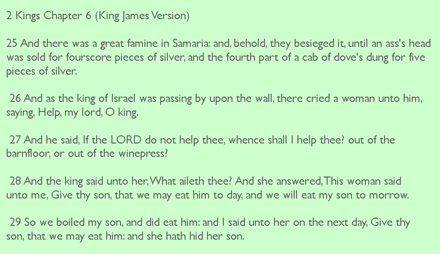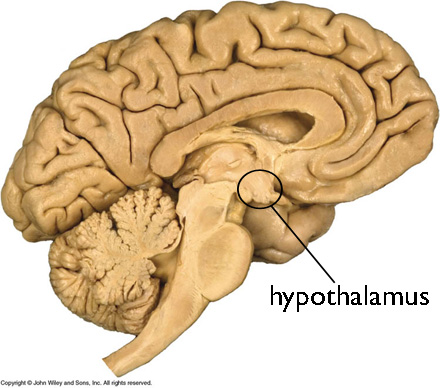Each Sunday, I’m excerpting a chapter of The Seven Deadly Synapses, a book on the neuroscience of sin. In this series, we’re examining the sin of Gluttony.
In part 1 of “Gluttony”, we didn’t get to the scientific part. It was mostly just a warm-up. Now it’s time to figure out how the taste system sends a signal to the brain, and how the digestive system handles food.
Gluttony
Part 2
For most of mankind’s history, eating has been the key to staying alive and so has been a human’s main job. Most of a person’s waking hours were devoted to getting calories, processing calories into a healthy and digestible form, and storing calories for future needs. The word “famine” appears 107 times in the King James Version of the Christian Bible (including the passage shown here, that describes a famine so severe that a mother boils and eats her son); “hunger” 60 times; “starve”, “starving”, “starvation”, 19 times. Other religious texts show a similar historical fixation with either metaphorical or real hunger: the word is used 74 times in the Qur’an, and only 18 times in the Upanishads. Gluttony is likely to be a sin mostly because it revels in the flaunting of what mankind has struggled so hard, for so many years, to achieve: nutrition.

To find food, and eat it, and to balance surfeit with famine, is the responsibility of a few thousand nerve cells in a pinky-end-sized hunk of brain called the hypothalamus. Just like the thermostat in your house keeps the household temperature close to where you want it to be, the hypothalamus is responsible for your body’s balancing acts, the processes and feedback loops that physiologists call “homeostatic mechanisms”. Like Goldilocks, we want our bodies to be “just right”. not too cold, not too hot; not too thin, not too fat; not too much breath, not too little. How the hypothalamus causes us mischief is the root of our story.
